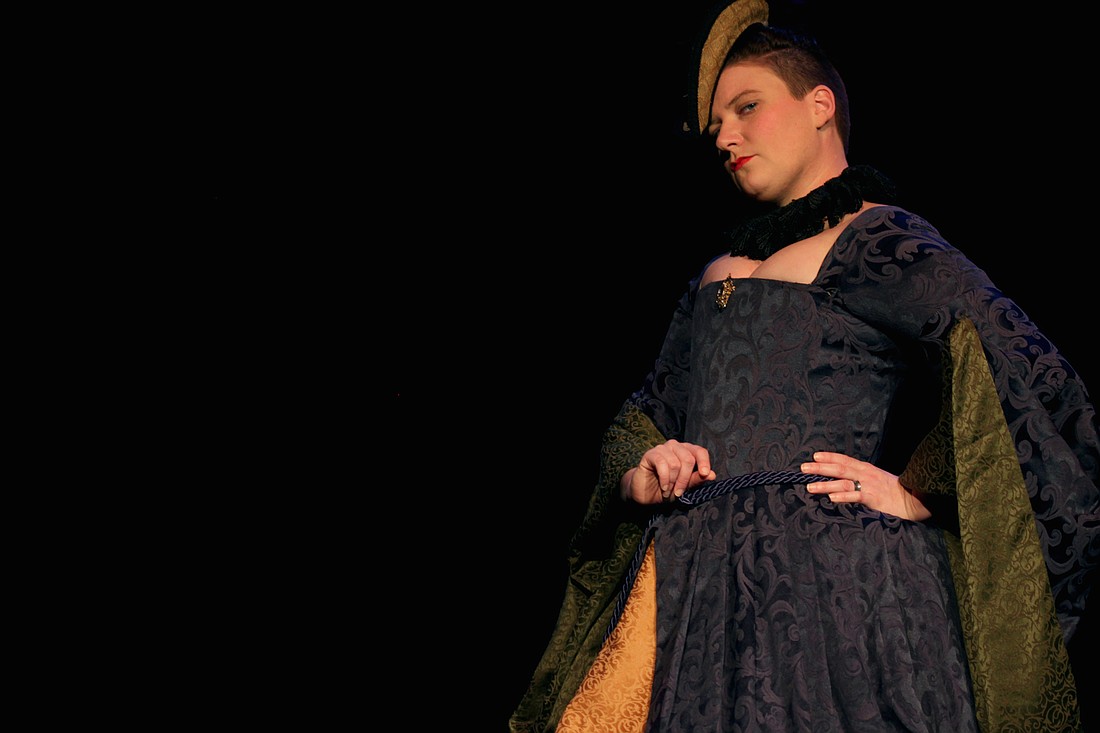- November 23, 2024
-
-
Loading

Loading

Monica Cross is New College of Florida’s production manager and technical director.
The college’s new black box theater is her home turf. She teaches the “technical” side of theater arts — but to Cross, that’s an arbitrary label. As she sees it, there’s no bright line between the technical and the magical. That’s the theme of her latest play, actually. “The Wonder of Our Stage” imagines that the greatest playwright of all time was an alchemist’s automaton.
Cross’ enchanting play won top honors at The Players Centre for the Performing Arts 2018 New Play Festival. Her magic will come to life in a fully staged performance next summer. In the meantime, here’s a taste of the spellbinding artistry behind it.
I oversee all of the theater produced by students, faculty and staff. I also teach technical theater courses.
I might be teaching theater students how to use lighting and sound equipment or helping them design and create costumes and sets for upcoming productions. Most of my lessons involve behind-the-scenes creativity. Most students already know what an actor does. They don’t know all the other bits and pieces of theater work — the artistry of set, prop, costume and lighting designers.
Yes, I do. As you know that also includes playwriting.
“The Wonder of Our Stage” imagines that Shakespeare was actually a wooden automaton who’d been created by the alchemist John Dee for Queen Elizabeth I. She thinks it’s a ploy and immediately walks away. So, in his first moments of awareness, this entity is rejected by the person he’d been created for. Now, he’s struggling with the meaning of his existence. But John Dee doesn’t give up. He built this thing; his reputation is at stake; and he wants Queen Elizabeth to acknowledge his greatness. His goal is to make the automaton more human.
Exactly. John Dee hires an actor, Richard Burbage, to teach his creation how to act like a man. The automaton takes on the name William Shakespeare, bonds with Richard Burbage and starts going to theaters. He eventually makes the transition from watching plays to writing plays.
Yes. And for John Dee’s purposes, the research project works all too well. Shakespeare ultimately rejects the path that John Dee laid out for him and finds his true calling in the theater. He begins by trying to act like a man. In the end, he becomes his own man. I think that’s an important distinction.
Thrilled and a little surprised, actually. My play’s off the beaten path. It’s a beautiful, (if somewhat bizarre) coming-of-age story. I wasn’t sure how people would respond to it.
There was a delightful lack of uniformity. Audience members laughed — but in different places. A line from “The Tempest” would get a laugh from one person. Someone else would chuckle at a quotation from “Romeo and Juliet.” After the play, people asked me, “Did you know it was funny?”
Yes and no. I have a weird relationship with humor. My sense of comedy is intermixed with drama.
No. And I think that’s a reflection of my training in Shakespearean literature. People are taught there’s a sharp distinction between comedy and tragedy. We often forget that Shakespeare wrote some really dark comedies. And some of his tragedies have some very funny moments.
My greatest influence is actually the android Data on “Star Trek,” and to a lesser extent, the “Frankenstein” and “Pinocchio” narratives. Along with the science fiction elements, my play also offers an underlying critique of Shakespearean criticism. Basically, it’s my answer to the anti-Stratfordians who deny that Shakespeare wrote the plays attributed to him. I’m saying, “Yes, Shakespeare did write those plays. He just happened to be a wooden automaton!”
Absolutely. I came into it with a strong draft. But gauging people’s responses is always helpful. It showed me what works and what could work better in terms of timing. I think some information needs to reach the audience sooner.
I want to finesse it a bit, but I think the structure is all set.
Yes. That’s always the hard part.
Again, I was thrilled and somewhat surprised. I can’t wait to see it on stage. It’s going to be a very long year.
I think it works on different levels with different people. Aside from the fantastic elements, it’s a coming-of-age story. I think many people will simply relate to the character’s personal journey. On the one hand, it’s a science fiction narrative. It involves a self-aware automaton, which had been created by alchemical means. Science fiction fans will appreciate that.
Admittedly, yes. On the other hand, the budding awareness of an artificial being is a classic science fiction theme. Aside from that, in the Elizabethan era, there was quite a bit of overlap between magic and science. John Dee was an alchemist, yes, but he practiced in a time when magic wasn’t yet divorced from scientific thought.
Exactly! That’s Arthur C. Clarke’s famous Third Law: “Any sufficiently advanced technology is indistinguishable from magic.” I think the same principle also applies to live theater. The craft behind it is all very technical. But it becomes pure magic when it comes to life on stage.